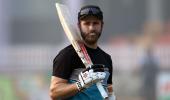
Shaping strategies to suit different oppositions and venues will be key for every team during the World Cup and New Zealand have an Indian, who is familiar with conditions and owns the data to assist them -- Saurabh Walkar, their performance analyst.
India and other Asian nations, who are masters of subcontinental conditions will demand a particular approach, while England's freight train-like cricket will warrant another.
Walkar is gearing up for the tough days ahead.
"It is a big opportunity for me as New Zealand is a very strong team, and they were finalists in the last two editions of the World Cup. It is a big challenge but I have confidence in my preparations," Walkar told PTI.
So, how did his stint with New Zealand eventuate?
"They were looking for a performance analyst who knows Indian conditions. Someone who has the experience of working with Indian players. New Zealand coach Gary Stead gave an audience to me, and it went really well," said Walkar.
New Zealand will start their World Cup campaign against defending champions England at Ahmedabad on October 5.
Another stern test awaits the Black Caps when they face hosts India on October 22 at Dharamsala.
But the Blackcaps can find some solace from the fact that Walkar is familiar with players from both the teams, and he might just have an extensive data bank on them.
"I have worked with players like Rohit Sharma and Suryakumar Yadav during my time with the Mumbai Ranji team. It was also a fanboy moment for me as I had watched them only on TV earlier.
"I have also associated with England cricketers like Jos Buttler during the Hundred at Manchester Originals.
"So, the New Zealand team will require some high-level input from me during the World Cup. My duty will be to provide that to Stead. I believe I have the data for it," said Walkar, who had worked eight years with the Mumbai Ranji side.
However, this is not the first time Walkar is getting associated with a national team.
The 38-year-old Mumbaikar had worked with Afghanistan during the ICC T20 World Cup 2021 in the UAE, in which Australia emerged the champions.
"Lance Klusener (then Afghanistan coach) interviewed me after applying for the job (of a performance analyst). I saw the job vacancy on their website. He was impressed with my presentation.
"It was a great experience as Afghanistan were also a very new team, and they were coming from a very different background. The whole team was very enthused about technical things and it was terrific to work with some talented players like Rashid Khan," he added.
Walkar's beginning as a performance analyst was not easy because he had to give up his engineering course in Electronics and Telecommunications in 2006, and along with it a possibly lucrative career also.
The spark for him to choose a career associated with cricket came rather unexpectedly.
"I always wanted to be associated with cricket. I had played some institutional cricket, local leagues etc. But that was not taking me anywhere.
"But I got a chance to be at England nets at CCI (Brabourne Stadium) and they had a performance analyst with them, and made me realise that I now have a way to continuously be involved in cricket,” he said.
England had stayed in Mumbai for a little over a week to play two warm-up matches against MCA XI in preparation for their ODI and Test tour in 2008.
But that decision to divert his career proved right as Walkar soon got an invitation to join Rajasthan Royals during the inaugural edition of the IPL.
It was a big break for a youngster to work along with some of the legends like Shane Warne.
"It was a remarkable experience. Shane Warne was not big on numbers, as he believed in keeping players motivated through a speech or a personal talk. Darren Berry (former RR technical director) was dealing with data and numbers," Walkar remembered.
Later, he received a chance to work with the Lucknow Supergiants, but by then the role of data analyst had assumed much more significance.
“Working at Lucknow (Supergiants) was a different experience as Andy Flower was a man of numbers and data. But what I have noticed is that the IPL franchises and players have opened up to the importance of data in cricket, something they looked down upon in the first two or three editions," he said.
Walkar also had to adapt himself to the new era.
"It is also about adapting yourself to the needs of players and teams that you associate with. In the earlier years, we also did not have too much data. But in 2023, we have a solid base of 16 or 17 years of data (of players) to bank on," he added.
Walkar has his own way of developing the database, something more hands on.
"I don't restrict myself to just screen presentations in a boardroom. But I get involved in net sessions as well. This will give me more data and also it is a chance to create more bonding with players," he added.












 © 2025
© 2025